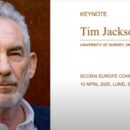

Research | Postgrowth Economics
At the heart of Prosperity without Growth is the call for a new ‘ecological macro-economics’: an understanding of the dynamics of the modern economy that can also incorporate the reality of ecological and resource constraints. A critical challenge for this new approach is the need to ensure economic and social stability even as relentless growth in consumer demand is attenuated. Forging a ‘postgrowth’ economics is central to Tim Jackson’s work.
The work itself draws on a wide range of theoretical and conceptual approaches – including ecological economics, post-Keynesian economics and modern money theory. Tim has been working closely with other economists – in particular the Canadian economist Peter Victor – to develop a suite of system dynamics models capable of describing a sustainable national economy operating within ecological limits. These include the FALSTAFF model which explores the financial and economic dimensions of a postgrowth economy; the SIGMA model which addresses the key challenge of inequality in the context of declining growth rates; and LowGrow SFC which develops scenarios for the Canadian economy out to 2067.
Key to these models is the concept of investment. Tim’s work places the idea of investment at the heart of sustainable prosperity. He argues that investment should be seen as one of the most important concepts in economics because it embodies the relationship between the present and the future. To achieve a sustainable prosperity, investment must help build and protect the assets on which future prosperity depends. As well as modelling the conceptual basis for this kind of investment, Tim has been working closely with a range of banks, investment funds and asset managers to turn theory into practice.
Further reading
Jackson, T 2025. The Care Economy. Cambridge: Polity Press.
Jackson T, Gallant B and S Mair 2023. Towards a Model of Baumol’s Cost Disease in a Post Growth Economy—developments of the FALSTAFF stock-flow consistent (SFC) model. CUSP Working Paper No. 37. Guildford: Centre for the Understanding of Sustainable Prosperity.
Jackson, T 2021. Post Growth. Life after Capitalism. Cambridge: Polity Press.
Corlet Walker C and T Jackson 2021. Tackling growth dependency—The case of adult social care. CUSP Working Paper Series No 28. Guildford: Centre for the Understanding of Sustainable Prosperity.
Jackson T and P Victor 2021. Confronting inequality in the “new normal”: Hyper‐capitalism, proto‐socialism, and post‐pandemic recovery. In: Sustainable Development, May 2021.
Jackson, T 2020. Wellbeing Matters—Tackling growth dependency. An Economy That Works Briefing Paper Series, No 3. London: All-Party Parliamentary Group on Limits to Growth, February 2020.
Jackson, T and P Victor 2020. The Transition to a Sustainable Prosperity-A Stock-Flow-Consistent Ecological Macroeconomic Model for Canada. Ecological Economics, Vol 177.
Jackson T and P A Victor 2019: LowGrow SFC: a stock-flow-consistent ecological macroeconomic model for Canada. CUSP Working Paper No 16. Guildford: University of Surrey.
Jackson T 2019: “All Models Are Wrong”—The challenge of modelling ‘deep decarbonisation’. CUSP Working Paper No 19. Guildford: University of Surrey.
Jackson, T 2018: The Post-Growth Challenge: Secular Stagnation, Inequality and the Limits to Growth. CUSP Working Paper No 12. Guildford: University of Surrey.
Jackson, T and P Victor 2018: Confronting inequality in a post-growth world – basic income, factor substitution and the future of work. CUSP Working Paper No 11. Guildford: University of Surrey.
Jackson, T, Victor, P and A Asjad Naqvi 2016. Towards a Stock – Flow Consistent Ecological Macroeconomics. WWW for Europe: Work Package 205, Milestone 40 “Report on model results including additional policies to counter averse effects”. Working Paper no 114.
Jackson, T and P Victor 2016. Does slow growth lead to rising inequality? Some theoretical reflections and numerical simulations. Ecological Economics, Vol 121, pp. 206–219.
Jackson, T and P Victor 2015. Does credit create a growth imperative? A quasi-steady state economy with interest-bearing debt. Ecological Economics, Vol 120, pp. 32–48.
Victor, P and T Jackson 2013. Developing a Demographic Sub-model and an Input-Output Structure for the Green Economy Macro-Model and Accounts (GEMMA) Framework, Final Report. CIGI-INET, 30 June 2013.
Jackson, T 2002. Quality of Life, Sustainability and Economic Growth. In: Cahill, M and A Fitzpatrick (Eds): Environment and Welfare: towards a green social policy, Palgrave Macmillan, London, 97-116.
Jackson, T 1996. Material Concerns – pollution profit and quality of life, Routledge, London, 218pp.




